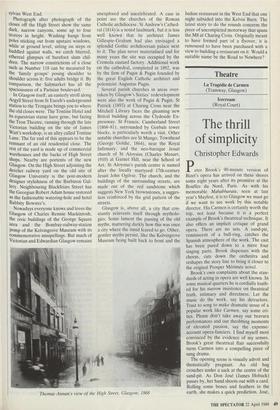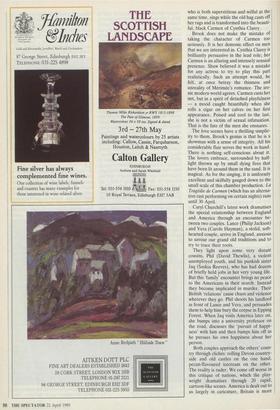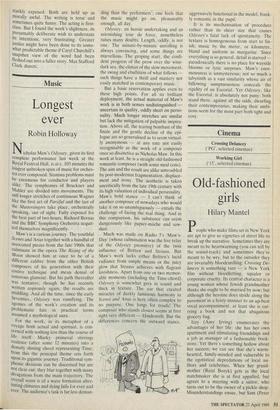Theatre
La Tragedie de Carmen (Tramway, Glasgow) Icecream (Royal Court)
The thrill of simplicity
Christopher Edwards
Peter Brook's 90-minute version of Bizet's opera has arrived on these shores some eight years after its premiere at the Bouffes du Nord, Paris. As with his memorable Mahabharata, seen at last year's Mayfest, it is to Glasgow we must go if we want to see work by this notable director. His Carmen is certainly worth the trip, not least because it is a perfect example of Brook's theatrical technique. It also offers an implicit critique of grand opera. There are no sets. A sand-pit, reminiscent of a bull-ring, catches the Spanish atmosphere of the work. The cast has been pared down to a mere four singing parts. Brook dispenses with the chorus, cuts down the orchestra and reshapes the story line to bring it closer to the original Prosper Merimee novel.
Brook's own complaints about the stan- dards of acting in opera are well known. In some musical quarters he is cordially loath- ed for his narrow insistence on theatrical truth, intimacy and directness. Let the music do the work, say his detractors. Trust to song to make dramatic sense of a popular work like Carmen, say some cri- tics. Please don't take away our bravura performances and our throbbing moments of elevated passion, say the expense- account opera-fanciers. I find myself most convinced by the evidence of my senses. Brook's great theatrical flair successfully turns Carmen into a compelling piece of sung drama.
The opening scene is visually adroit and thematically pregnant. An old hag crouches under a sack at the centre of the sand-pit. As Don Jose (James Hoback) passes by, her hand shoots out with a card. Rolling some bones and feathers in the earth, she makes a quick prediction. Jose, who is both superstitious and wilful at the same time, sings while the old hag casts off her rags and is transformed into the beauti- ful, black Carmen of Cynthia Clarey. Brook does not make the mistake of taking the character of Carmen too seriously. It is her demonic effect on men that we are interested in. Cynthia Clarey is brilliantly persuasive in the lead role; her Carmen is an alluring and intensely sensual presence. Shaw believed it was a mistake for any actress to try to play this part realistically. Such an attempt would, he felt, at once betray the thinness and unreality of Merimee's romance. The iro- nic modern world agrees. Carmen casts her net, but in a spirit of detached playfulness — a mood caught beautifully when she rolls a cigar on her calves on her first appearance. Poised and cool to the last, she is not a victim of sexual infatuation. That is the fate of the men she ensnares.
The love scenes have a thrilling simplic- ity to them. Brook's genius is that he is a showman with a sense of integrity. All his considerable flair serves the work in hand. There is nothing self-conscious about it. The lovers embrace, surrounded by half- light thrown up by small dying fires that have been lit around them in the sand. It is magical. As for the singing, it is uniformly excellent and skilfully gauged down to the small scale of this chamber production. La Tragedie de Carmen (which has an alterna- tive cast performing on certain nights) runs until 30 April.
Caryl Churchill's latest work dramatises the special relationship between England and America through an encounter be- tween two couples. Lance (Philip Jackson) and Vera (Carole Hayman), a stolid, soft- hearted couple, arrive in England, anxious to savour our grand old traditions and to try to trace their roots.
They light upon some very distant cousins, Phil (David Thewlis), a violent unemployed youth, and his punkish sister Jaq (Saskia Reeves), who has had dozens of briefly held jobs in her very young life. But this 'family' encounter brings no peace to the Americans in their search. Instead they become implicated in murder. Their British 'relations' cause chaos and violence wherever they go. Phil shoots his landlord in front of Lance and Vera, and persuades them to help him bury the corpse in Epping Forest. When Jaq visits America later on, she bumps into a university professor on the road, discusses the 'pursuit of happi- ness' with him and then bumps him off as he pursues his own happiness about her person.
Both couples approach the others' coun- try through clichés: rolling Devon country- side and old castles on the one hand, pecan-flavoured icecream on the other. The reality is ruder. We come off worse in this critique of nations, which the play- wright dramatises through 20 rapid, cartoon-like scenes. America is dealt out to us largely in caricature, Britain is more starkly exposed. Both are held up as morally awful. The writing is terse and sometimes quite funny. The acting is first- class. But I found the work's slightness, its Presumably deliberate wish to understate its intentions, very frustrating. Greater Justice might have been done to its Some- what predictable theme if Caryl Churchill's snapshot view of the word had been fleshed out into a fuller story. Max Stafford Clark directs.




































































 Previous page
Previous page